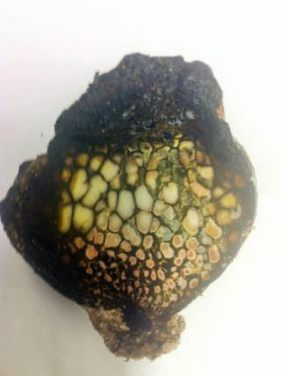On Monday, NASA announced the discovery of two new categories of microbial life which seem to enjoy feasting on fossil fuels like gasoline and diesel. Scientists are examining if the newly found bacteria could perhaps clean up harmful toxins from the oceans. Among them is Kenneth Cullings, an ecologist and a member of the Santa Barbara nonprofit organization CLAWS, the Committees for Land, Air, Water and Species.
Cullings is a senior research ecologist with NASA’s environmental group and was exploring the Norris Geyser Basin in Yellowstone National Park when he came across the fungus Pisolithus arhizus. The basin is home to soil with a high concentration of sulfur and other toxins, as well as some of the tallest acid geysers in the world. For 50 years, P. arhizus has been known to oxidize sulfur, but the discovery of the new bacteria inside the fungus challenges that idea.
“The question is, who’s really doing the work? Is it the fungus, or the bacteria inside?” Cullings asked. “Since we’ve just started looking at the bacteria inside these things, there’s a whole world of potential agents that might be at work here.”
Get the top stories in your inbox by signing up for our daily newsletter, Indy Today.
Contained within the fungus is an ecosystem of metals, bacteria, sulfur, algae, hydrocarbons, and microorganisms. It is here that two new categories of microbes were discovered.
Cullings and the research group believe the new bacteria can consume toxic junk and waste and convert it into energy. Early results from the study show that the bacteria can clean up gasoline, oil, diesel, and more. If this is the case, the bacteria could be a key to purifying wastewater and clearing toxins from the ocean, all while producing energy at the same time.

“What we’re doing is extending this discovery to ask the practical question, ‘What the heck are we surfing in?’” said Cullings, who is a surfer who lives in Oxnard Shores. He also explained that the bacteria can help scientists track and understand what pollutants are appearing in the ocean from local rivers. “You can use microbes as an indicator of what’s coming up in the water,” he said.
The bacteria could also help scientists learn more about strains of bacteria that have become resistant to antibiotics, also known as superbugs. “Antibiotic-resistant bacteria is being dumped into oceans, and at the local level, surf spots,” Cullings said. “And we don’t have any idea of what level, how many, [or] what kind.”
The new bacteria bring hope for the study of life beyond Earth, too. Microbial life has long provided insight into life on other planets. For example, lichens, which are composites of algae and fungus, have survived trips to space as well as simulations of conditions on Mars. A NASA/Ames Research Center story broadened the concept: “Discovering this thriving self-sustaining ecosystem in such a harsh environment gives scientists new ideas for how to live sustainably here on Earth, how life here began, and where else in the universe it may thrive.”
Cullings explained the connection, noting that the idea is a speculation for now: “If something fungus-like had evolved [on Mars] and something bacteria-like had evolved, they could find each other and help each other survive in much the same way that these little fungus balls survive in the thermal spring areas of Yellowstone.”
At the Santa Barbara Independent, our staff is working around the clock to cover every aspect of this crisis — sorting truth from rumor. Our reporters and editors are asking the tough questions of our public health officials and spreading the word about how we can all help one another. The community needs us — now more than ever — and we need you in order to keep doing the important work we do. Support the Independent by making a direct contribution or with a subscription to Indy+.
"eat" - Google News
June 06, 2020 at 11:10PM
https://ift.tt/30f8TMV
A Microbe That Might Eat Gasoline - Santa Barbara Independent
"eat" - Google News
https://ift.tt/33WjFpI
https://ift.tt/2VWmZ3q
Bagikan Berita Ini














0 Response to "A Microbe That Might Eat Gasoline - Santa Barbara Independent"
Post a Comment